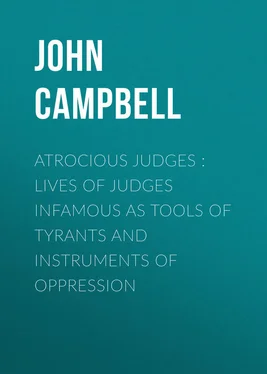John Campbell - Atrocious Judges - Lives of Judges Infamous as Tools of Tyrants and Instruments of Oppression
Здесь есть возможность читать онлайн «John Campbell - Atrocious Judges - Lives of Judges Infamous as Tools of Tyrants and Instruments of Oppression» — ознакомительный отрывок электронной книги совершенно бесплатно, а после прочтения отрывка купить полную версию. В некоторых случаях можно слушать аудио, скачать через торрент в формате fb2 и присутствует краткое содержание. Жанр: foreign_antique, foreign_prose, Биографии и Мемуары, на английском языке. Описание произведения, (предисловие) а так же отзывы посетителей доступны на портале библиотеки ЛибКат.
- Название:Atrocious Judges : Lives of Judges Infamous as Tools of Tyrants and Instruments of Oppression
- Автор:
- Жанр:
- Год:неизвестен
- ISBN:нет данных
- Рейтинг книги:5 / 5. Голосов: 1
-
Избранное:Добавить в избранное
- Отзывы:
-
Ваша оценка:
- 100
- 1
- 2
- 3
- 4
- 5
Atrocious Judges : Lives of Judges Infamous as Tools of Tyrants and Instruments of Oppression: краткое содержание, описание и аннотация
Предлагаем к чтению аннотацию, описание, краткое содержание или предисловие (зависит от того, что написал сам автор книги «Atrocious Judges : Lives of Judges Infamous as Tools of Tyrants and Instruments of Oppression»). Если вы не нашли необходимую информацию о книге — напишите в комментариях, мы постараемся отыскать её.
Atrocious Judges : Lives of Judges Infamous as Tools of Tyrants and Instruments of Oppression — читать онлайн ознакомительный отрывок
Ниже представлен текст книги, разбитый по страницам. Система сохранения места последней прочитанной страницы, позволяет с удобством читать онлайн бесплатно книгу «Atrocious Judges : Lives of Judges Infamous as Tools of Tyrants and Instruments of Oppression», без необходимости каждый раз заново искать на чём Вы остановились. Поставьте закладку, и сможете в любой момент перейти на страницу, на которой закончили чтение.
Интервал:
Закладка:
Fleming, immediately upon his promotion, gave up his serjeantship, and practised in the Court of Queen’s Bench. He was found very useful in doing the official business, and gave entire satisfaction to his employers.
At the calling of a new Parliament, in the autumn of 1601, he was returned to the House of Commons for a Cornish borough; and, according to the usual practice at that time, he ought, as solicitor general, to have been elected speaker; but his manner was too “lawyer-like and ungenteel” for the chair, and Serjeant Croke, who was more presentable, was substituted for him.
He opened his mouth in the house only once, and then he broke down. This was in the great debate on the grievance of monopolies. He undertook to defend the system of granting to individuals the exclusive right of dealing in particular commodities; but when he had described the manner in which patents passed through the different offices before the great seal is put to them, he lost his recollection and resumed his seat.
Bacon, now member for Middlesex, to show what a valuable solicitor general the government had lost, made a very gallant speech, in which he maintained that “the queen, as she is our sovereign, hath both an enlarging and restraining power: for, by her prerogative, she may, 1st, set at liberty things restrained by statute law or otherwise; and 2dly, by her prerogative she may restrain things which be at liberty.” He concluded by expressing the utmost horror of introducing any bill to meddle with the powers of the crown upon the subject, and protesting that “the only lawful course was to leave it to her majesty of her own free will to correct any hardships, if any had arisen in the exercise of her just rights, as the arbitress of trade and commerce in the realm.”
This pleased her exceedingly, and even softened her ministers, insomuch that a promise was given to promote Fleming as soon as possible, and to appoint Bacon in his place. In those days there never existed the remotest notion of dismissing an attorney or solicitor general, any more than a judge; for, though they all alike held during pleasure , till the accession of the house of Stuart the tenure of all of them was practically secure. An attempt was made to induce Fleming to accept the appointment of queen’s serjeant, which would have given him precedence over the attorney general; but this failed, for he would thereby have been considered as put upon the shelf, instead of being on the highway to promotion.
Elizabeth died, leaving Bacon with no higher rank than that of queen’s counsel; and on the accession of James I., Fleming was reappointed solicitor general.
The event justified his firmness in resisting the attempt to shelve him, for in the following year, on the death of Sir William Peryam, he was appointed chief baron of the Exchequer. While he held this office, he sat along with Lord Chief Justice Popham on the trial of Guy Fawkes and the gunpowder conspirators; but he followed the useful advice for subordinate judges on such an occasion – “to look wise, and to say nothing.”
His most memorable judgment as chief baron was in what is called “The Great Case of Impositions.” This was, in truth, fully as important as Hampden’s case of ship money, but did not acquire such celebrity in history, because it was long acquiesced in, to the destruction of public liberty, whereas the other immediately produced the civil war. After an act of Parliament had passed at the commencement of James’s reign, by which an import duty of 2 s. 6 d. per cwt. was imposed upon currants, he by his own authority laid on an additional duty of 7 s. 6 d. , making 10 s. per cwt. Bates, a Levant merchant, who had imported a cargo of currants from Venice, very readily paid the parliamentary duty of 2 s. 3 d. upon it, but refused to pay more; thereupon the attorney general filed an information in the Court of Exchequer, to compel him to pay the additional duty of 7 s. 6 d. ; so the question arose, whether he was by law compellable to do so. After arguments at the bar which lasted many days, —
Fleming, C. B. , said: “The defendant’s plea in this case is without precedent or example, for he alleges that the imposition which the king has laid is ‘ indebitè, injustè, et contra leges Angliæ imposita , and, therefore, he refused to pay it.’ The king, as is commonly said in our books, cannot do wrong ; and if the king seize any land without cause, I ought to sue to him in humble manner ( humillime supplicavit , &c.), and not in terms of opposition. The matter of the plea first regards the prerogative, and to derogate from that is a part most undutiful in any subject. Next it concerns the transport of commodities into and out of the realm, the due regulation of which is left to the king for the public good. The imposition is properly upon currants, and not upon the defendant, for upon him no imposition shall be but by Parliament.(!) The things are currants, a foreign commodity. The king may restrain the person of a subject in leaving or coming into the realm, and a fortiori , may impose conditions on the importation or exportation of his goods. To the king is committed the government of the realm; and Bracton says, ‘that for his discharge of his office God hath given him the power to govern.’ This power is double – ordinary and absolute. The ordinary is for the profit of particular subjects – the determination of civil justice; that is nominated by civilians jus privatum , and it cannot be changed without Parliament. The absolute power of the king is applied for the general benefit of the people; it is most properly named policy , and it varieth with the time, according to the wisdom of the king, for the common good. If this imposition is matter of state, it is to be ruled by the rules of policy, and the king hath done well, instead of ‘unduly, unjustly, and contrary to the laws of England.’ All commerce and dealings with foreigners, like war and peace and public treaties, are regulated and determined by the absolute power of the king. No importation or exportation can be but at the king’s ports. They are his gates, which he may open or close when and on what conditions he pleases. He guards them with bulwarks and fortresses, and he protects ships coming hither from pirates at sea; and if his subjects are wronged by foreign princes, he sees that they are righted. Ought he not, then, by the custom he imposes, to enable himself to perform these duties? The impost to the merchant is nothing, for those who wish for his commodities must buy them subject to the charge; and, in most cases, it shall be paid by the foreign grower, and not by the English consumer. As to the argument that the currants are victual , they are rather a delicacy, and are no more necessary than wine, on which the king lays what customs seemeth him good. For the amount of the imposition it is not unreasonable, seeing that it is only four times as much as it was before. The wisdom and providence of the king must not be disputed by the subject; by intendment they cannot be severed from his person. And to argue a posse ad actum , because by his power he may do ill, is no argument to be used in this place. If it be objected that no reason is assigned for the rise, I answer it is not reasonable that the king should express the cause and consideration of his actions; these are arcana regis , and it is for the benefit of every subject that the king’s treasure should be increased.”
He then at enormous length went over all the authorities and acts of Parliament, contending that they all prove the king’s power to lay what taxes he pleases on goods imported, and he concluded by giving judgment for the crown.
Читать дальшеИнтервал:
Закладка:
Похожие книги на «Atrocious Judges : Lives of Judges Infamous as Tools of Tyrants and Instruments of Oppression»
Представляем Вашему вниманию похожие книги на «Atrocious Judges : Lives of Judges Infamous as Tools of Tyrants and Instruments of Oppression» списком для выбора. Мы отобрали схожую по названию и смыслу литературу в надежде предоставить читателям больше вариантов отыскать новые, интересные, ещё непрочитанные произведения.
Обсуждение, отзывы о книге «Atrocious Judges : Lives of Judges Infamous as Tools of Tyrants and Instruments of Oppression» и просто собственные мнения читателей. Оставьте ваши комментарии, напишите, что Вы думаете о произведении, его смысле или главных героях. Укажите что конкретно понравилось, а что нет, и почему Вы так считаете.












